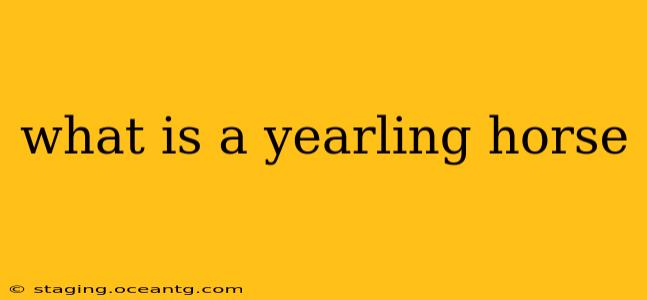A yearling horse is simply a horse that is between one and two years old. This is a crucial stage in a horse's development, a period of significant growth and change that shapes its future as a riding horse, breeding animal, or companion. Understanding the characteristics and needs of a yearling is vital for anyone involved in equine care, whether you're a seasoned breeder or a curious horse enthusiast.
What are the characteristics of a yearling horse?
Yearlings are easily distinguishable from foals (horses under one year old) and adult horses. While they've shed their gangly foaliness, they're still noticeably smaller and less developed than adult horses of their breed. Their bodies are continuing to grow rapidly, and their musculature is still developing strength and definition. Their coat may also be less refined than that of a mature horse. Expect to see some variations in size and development based on breed and individual genetics.
What is the difference between a yearling and a foal?
The primary difference lies in age. A foal is a horse under one year old, while a yearling is between one and two years old. Foals are typically more clumsy and dependent on their mothers, still exhibiting immature behaviors. Yearlings, while still developing, demonstrate increased coordination, independence, and a more refined personality. They are often weaned from their mothers by this stage and are becoming more accustomed to handling and training, depending on their intended use.
How much does a yearling horse weigh?
The weight of a yearling horse varies considerably depending on breed, sex, and individual genetics. Some breeds are naturally larger than others; a yearling Thoroughbred will typically weigh less than a yearling draft horse. While there's no single definitive weight, a range from 500 to 1000 pounds is typical for many breeds. It's essential to remember this is a wide range and should not be taken as an absolute measure.
What should a yearling horse eat?
Nutrition is paramount during this growth phase. A yearling's diet should provide high-quality forage, such as good-quality hay, forming the bulk of their intake. A balanced commercial feed formulated for yearlings provides necessary supplements to support optimal development. Access to clean, fresh water is always crucial. Overfeeding can lead to developmental orthopedic issues, so monitoring food intake is essential. Consulting with a veterinarian or equine nutritionist can provide personalized recommendations based on the individual horse's needs and breed.
When can you start training a yearling horse?
The age at which you start training a yearling will depend on your horse's maturity, breed and temperament and your goals for the horse. Gentle handling and socialization should begin early in the foal's life. More formal training, such as basic ground work and riding, is typically introduced around 18 months to two years, but this can vary considerably. Early, positive interactions are crucial to build a good relationship between horse and handler.
How much does a yearling horse cost?
The price of a yearling horse varies dramatically depending on several factors. The breed is a major influencer, with purebred horses from established bloodlines commanding higher prices than mixed breeds. The yearling's conformation (physical structure), athletic potential, and pedigree also heavily influence value. Additionally, the horse's training and the seller's location will contribute to the overall cost. Expect to find a wide range of prices, from several thousand dollars to tens or even hundreds of thousands for exceptional specimens.
What health concerns are common in yearling horses?
Several health issues are more prevalent in yearlings due to their rapid growth. Developmental orthopedic disease (DOD), affecting joints and bones, is a significant concern. Parasites are another potential threat, requiring regular deworming. Respiratory issues are also relatively common. Regular veterinary check-ups are essential to monitor the horse's health and address any emerging problems promptly. Early detection and intervention are key to managing these issues effectively. A balanced diet, proper exercise, and diligent care are vital for preventing many health problems.
This comprehensive guide provides a solid foundation for understanding yearling horses. Remember that each horse is an individual, and these guidelines are general. Always consult with experienced equine professionals for advice specific to your horse's needs.
